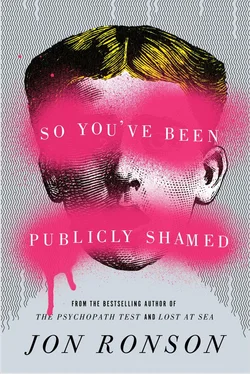—
The common assumption is that public punishments died out in the new great metropolises because they’d been judged useless. Everyone was too busy being industrious to bother to trail some transgressor through the city crowds like some volunteer scarlet letter. But according to the documents I found, that wasn’t it at all. They didn’t fizzle out because they were ineffective. They were stopped because they were far too brutal.
The movement against public shaming was already in full flow in March 1787 when Benjamin Rush, a United States founding father, wrote a paper calling for their outlawing — the stocks, the pillory, the whipping post, the lot.
Ignominy is universally acknowledged to be a worse punishment than death… It would seem strange that ignominy should ever have been adopted as a milder punishment than death, did we not know that the human mind seldom arrives at truth up on any subject till it has first reached the extremity of error.
— BENJAMIN RUSH, “AN ENQUIRY INTO THE EFFECTS OF PUBLIC PUNISHMENTS UPON CRIMINALS, AND UPON SOCIETY,” MARCH 9, 1787
In case you consider Rush too much of a bleeding-heart liberal, it’s worth pointing out that his proposition for alternatives to public shaming included taking the criminal into a private room — away from the public gaze — and administering “bodily pain.”
To ascertain the nature, degrees, and duration of the bodily pain will require some knowledge of the principles of sensation and of the sympathies which occur in the nervous system.
Public punishments were abolished within fifty years of Rush’s paper, with only Delaware weirdly holding out until 1952 (which is why the Delaware whipping critiques I excerpt were published in the 1870s).
The New York Times , baffled by Delaware’s obstinacy, tried to argue the state into change in an 1867 editorial.
If it had previously existed in [the convicted person’s] bosom a spark of self-respect this exposure to public shame utterly extinguishes it. Without the hope that springs eternal in the human breast, without some desire to reform and become a good citizen, and the feeling that such a thing is possible, no criminal can ever return to honorable courses. The boy of eighteen who is whipped at New Castle [a Delaware whipping post] for larceny is in nine cases out of ten ruined. With his self-respect destroyed and the taunt and sneer of public disgrace branded upon his forehead, he feels himself lost and abandoned by his fellows.
— QUOTED IN ROBERT GRAHAM CALDWELL, Red Hannah: Delaware’s Whipping Post
As Jonah Lehrer stood in front of that giant-screen Twitter feed on February 12, 2013, he experienced something that had been widely considered appalling in the eighteenth century.
I left the Massachusetts Historical Society, took out my phone, and asked Twitter, “Has Twitter become a kangaroo court?”
“Not a kangaroo court,” someone replied quite tersely. “Twitter still can’t impose real sentences. Just commentary. Only unlike you, Jon, we aren’t paid for it.”
Was he right? It felt like a question that really needed answering because it didn’t seem to be crossing any of our minds to wonder whether the person we had just shamed was okay or in ruins. I suppose that when shamings are delivered like remotely administered drone strikes nobody needs to think about how ferocious our collective power might be. The snowflake never needs to feel responsible for the avalanche.
• • •
Lehrer’s intention in submitting himself to a public grilling was to show the world that he’s ready to return to journalism, that we can trust him because he knows now not to trust himself. All he proved is that he’s not wired like the rest of us. If he can figure out why that is, that would be a neuroscience story worth publishing.
— JEFF BERCOVICI, Forbes , FEBRUARY 12, 2013
I’ve been banging the drum for Lehrer to quiet his detractors and bank some goodwill by donating that $20,000 to charity… Finally, I managed to get him on the phone this afternoon. “I’m not interested in commenting,” he told me. Could he at least say whether he planned to keep the money? “I read your article. I have nothing to say to you,” he said, before hanging up.
— JEFF BERCOVICI, Forbes , FEBRUARY 13, 2013
“I’m still not entirely sure what I can give you…” Jonah was talking to me on the phone from his home in Los Angeles.
“The twenty thousand dollars…” I said.
“It was absolutely a mistake,” he said. “I didn’t ask for it. It was offered. They just gave it to me. I mean, what else do you want? I…” Jonah paused. “Look, I got bills to pay. I haven’t earned a penny in seven months. I was flying high, I was making lots of money. And all of a sudden you’re making no money.”
Jonah had finally agreed to a lengthier interview. He sounded exhausted, like he’d been inside some spinning machine designed by aliens to test the effects of stress on humans. For a smart man, everything he’d done from the moment Michael first e-mailed him had been a giant miscalculation. He’d been like a popped balloon shooting wildly in all directions, lying frantically to Michael before slumping, the air all gone, in the middle of one of the most terrible shamings of our time.
“A friend forwarded me a blog post by Jerry Coyne from the University of Chicago,” Jonah said. “An eminent guy, I interviewed him on occasion. He wrote a blog post about me where he called me a sociopath.”
I sense that Lehrer is a bit of a sociopath. Yes, shows of contrition are often phony, meant to convince a gullible public (as in Lance Armstrong’s case) that they’re good to go again. But Lehrer can’t even be bothered to fake an apology that sounds meaningful. Call me uncharitable, but if I were a magazine editor, I’d never hire him.
— JERRY COYNE, QUOTED ON RICHARDBOWKER.COM, FEBRUARY 18, 2013
“I thought of you,” Jonah said. “I thought, That’s an interesting question for Jon. Jon’s spent some time with me. Maybe I am a sociopath.”
The question didn’t surprise me. Ever since I published a book about psychopaths, people have been asking me if they’re one (or, if not them, their boss or their ex-boyfriend or Lance Armstrong). Perhaps Jonah was honestly intrigued by the possibility that he was one, but I didn’t think so. I think he knew he wasn’t, and he had a different reason for wanting to have this conversation. Academics shouldn’t diagnose people from afar as sociopaths. It was a stupid thing for Jerry Coyne to have done. I think Jonah wanted us to bitch about his stupidity for a moment. It would be a way for him to recover some self-esteem — to do a bit of shaming of someone else. Jonah was at rock bottom, so I was happy to go along with it. I told Jonah that he didn’t seem like someone who had no conscience.
“Who the hell knows what a conscience is,” Jonah replied. “If a conscience is living in a world defined by regrets, then, yeah, I’ve got a conscience. My very first thought every morning is what I’ve done wrong. That sounds self-pitying and I’d like you not to use that quote, but there’s no other way around it.”
“If it felt really important to use that quote, could I?” I asked him.
Jonah sighed. “I mean, it depends how you use it, but I’d prefer you not use it,” he replied.
I use the quote here because it seems important, given that so many people imagine Jonah has some neurological lack of conscience.
“Regrets of the sort I have are all-consuming,” Jonah continued. “I think about what I’ve done to the people I loved. What I’ve put my wife through. What I’ve put my brother through. What I’ve put my parents through. That is haunting. Long after I get over the loss of my status, and the loss of my career, which I enjoyed, I will never… Life is short. And I have caused tremendous pain to the people I love. I don’t know what that feeling’s called. Remorse sounds about right. There’s a tremendous amount of remorse. And as time passes, that isn’t going away. It is miserable and haunting.”
Читать дальше












